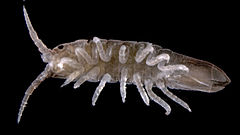"Sea centipede" is a vernacular name that may refer to any of several real, mythological, or cryptozoological marine-dwelling animals, including:
- Various polychaete worms, especially in the family Nereididae [1] [2]
- Various marine Isopoda [3] [4]
- The many-finned sea serpent, or "great sea-centipede", a mythical sea creature
True centipedes (class Chilopoda) are venomous, many-legged arthropods, and while no living species are fully marine, several species inhabit the intertidal zone (including beaches and rocky shores), and can tolerate occasional inundation by seawater. These centipedes are primarily in the group Geophilomorpha, commonly known as soil centipedes. [5] [6]
See also
- Sea scorpions or eurypterids, extinct marine arthropods distantly related to arachnids
- Sea snakes, venomous marine snakes
- Sea spiders or pycnogonids, marine arthropods
References
- ^ Bradstock, Mike (1985). Between the Tides: New Zealand Shore and Estuary Life. Auckland: Reed Methuen Publishers. p. 114. ISBN 0474000117.
- ^ Beavis, Ian C. (1988). Insects and Other Invertebrates in Classical Antiquity. Exeter, Devon: University of Exeter. p. 11. ISBN 0859892840.
- ^ "Sea Centipede". merriam-webster.com.
- ^ Dell, Richard K.; Heath, Eric W. (1971). Seashore Life of New Zealand. Wellington, NZ: Reed. p. 44. ISBN 0589006630. OCLC 257230.
- ^ Hoffman, Richard; Carlton, James T. (2007). "Chilopoda". In Carlton, James T. (ed.). The Light and Smith Manual: Intertidal Invertebrates from Central California to Oregon (4th ed.). Berkeley: University of California Press. pp. 692–693. ISBN 9780520239395.
- ^ Blower, J. Gordon (1957). "Feeding habits of a marine centipede". Nature. 180 (4585): 560. Bibcode: 1957Natur.180..560B. doi: 10.1038/180560a0. S2CID 4182919.
"Sea centipede" is a vernacular name that may refer to any of several real, mythological, or cryptozoological marine-dwelling animals, including:
- Various polychaete worms, especially in the family Nereididae [1] [2]
- Various marine Isopoda [3] [4]
- The many-finned sea serpent, or "great sea-centipede", a mythical sea creature
True centipedes (class Chilopoda) are venomous, many-legged arthropods, and while no living species are fully marine, several species inhabit the intertidal zone (including beaches and rocky shores), and can tolerate occasional inundation by seawater. These centipedes are primarily in the group Geophilomorpha, commonly known as soil centipedes. [5] [6]
See also
- Sea scorpions or eurypterids, extinct marine arthropods distantly related to arachnids
- Sea snakes, venomous marine snakes
- Sea spiders or pycnogonids, marine arthropods
References
- ^ Bradstock, Mike (1985). Between the Tides: New Zealand Shore and Estuary Life. Auckland: Reed Methuen Publishers. p. 114. ISBN 0474000117.
- ^ Beavis, Ian C. (1988). Insects and Other Invertebrates in Classical Antiquity. Exeter, Devon: University of Exeter. p. 11. ISBN 0859892840.
- ^ "Sea Centipede". merriam-webster.com.
- ^ Dell, Richard K.; Heath, Eric W. (1971). Seashore Life of New Zealand. Wellington, NZ: Reed. p. 44. ISBN 0589006630. OCLC 257230.
- ^ Hoffman, Richard; Carlton, James T. (2007). "Chilopoda". In Carlton, James T. (ed.). The Light and Smith Manual: Intertidal Invertebrates from Central California to Oregon (4th ed.). Berkeley: University of California Press. pp. 692–693. ISBN 9780520239395.
- ^ Blower, J. Gordon (1957). "Feeding habits of a marine centipede". Nature. 180 (4585): 560. Bibcode: 1957Natur.180..560B. doi: 10.1038/180560a0. S2CID 4182919.

